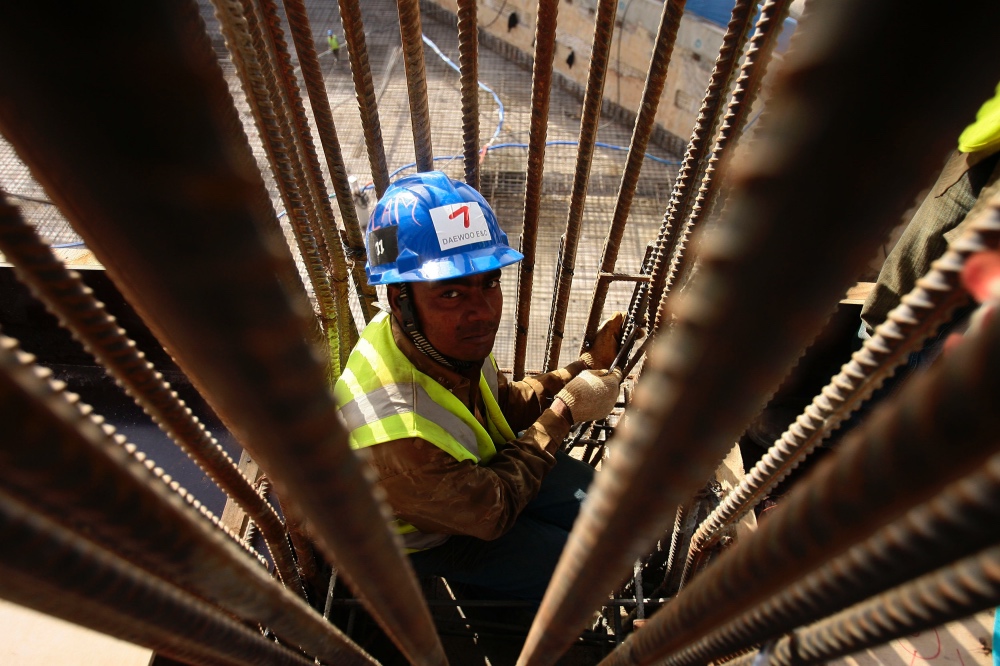Dhaka, Bangladesh
Thomson Reuters Foundation
Six months ago, Sajjad Hossain left Bangladesh hoping to build a new life in Europe, but he is now waiting to be sent home after being injured by an air strike in Libya.
Hossain, 19, was hit when the detention centre where he was staying in the capital, Tripoli, was bombed earlier this month, killing at least 50 migrants.
“It was his dream to go abroad and earn for his family,” his brother, Ektar Mollah, who is in touch with him, told the Thomson Reuters Foundation by phone.
“We don’t even know when he will be able to hear or walk properly again.”

A Bangladeshi construction labourer works at the site of a hotel building project in Tripoli, on 26th January, 2009. PICTURE: Reuters/Zohra Bensemra
The United Nations migration agency plans to repatriate Hossain and another injured Bangladeshi from its shelter, but it is unclear when this will happen, said Mollah.
Bangladesh is one of the world’s largest exporters of manpower. The UN migration agency estimates there are 24,000 Bangladeshi migrants in Libya – the largest number of people from Asia and four per cent of the entire migrant population.
The attack on the Tripoli migrant centre was the latest escalation in a conflict that developed after former leader Muammar Gaddafi was toppled in a NATO-backed uprising in 2011.
Smugglers and traffickers have exploited the turmoil to send hundreds of thousands of migrants on dangerous journeys across the Mediterranean, though the number of crossings dropped sharply from 2017 amid an EU-backed push to block departures.
But hopeful migrants continue to travel to Libya.
“His broker assured him of a safe way to Europe,” said Mollah. “He was told that he would be sent to Italy on a ship. But they were all lies.”
At least 100 Bangladeshi migrants hoping to get to Europe have been rescued off the Tunisian coast from different boats in the last two months.
“There is a trafficking syndicate that is still cheating people and bringing them here,” said ASM Ashraful Islam, labour counsellor in the Bangladesh embassy in Libya.
“As far as I know, people who have tried to go to Italy in the last few months have failed.”
Islam said traffickers are taking advantage of the battle for Tripoli, which is controlled by forces aligned with the internationally recognised government, compelling security forces to focus on the capital and not the borders.
Bangladesh depends heavily on foreign remittances, with at least 1 million securing jobs overseas in 2017, the largest number ever recorded by the government.
But Bangladeshi migrants have to pay some of the highest recruitment fees in the world because the system depends mainly on unlicensed brokers in rural areas, which campaigners say leads to exploitation and trafficking.
Mohammad Shopon was tricked into going to Libya in 2018 after a broker claimed to have arranged a job that paid in dollars for him.
“I was kidnapped by the people who were supposed to employ me,” he said by phone from Libya.
“After I paid them, they sold me to another group. This went on until my family had spent 10 lakh takas ($1US1,846) for my survival.”
Shopon has two jobs and barely sleeps as he does a 10-hour night shift making bread in a bakery. He earns about $US275 a month – no more than he could have made back home in Bangladesh.
“What else can I do? I took lots of loans just to get to Libya. And now I am trapped,” he said.
“I want to advise Bangladeshis to not come here. You don’t know if you’re going to live or die.”




